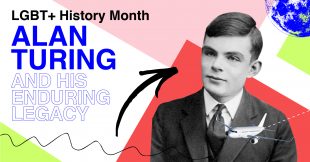LGBT+ History Month: Alan Turing and his enduring legacy

Alan Turing was born in London in 1912 just two years before the First World War. Growing up in the aftermath of brutal international conflict, Turing’s parents were keen to ensure that their son was able to thrive within education.
Early Life
His passion for learning became clear when at the age of 13, the 1926 General Strike prevented Alan from attending his first day of school. Determined not to miss it, Alan Turing cycled 60 miles on his bike unaccompanied, stopping overnight at an inn and attending school the next day.
Achievements and Hardships
It became clear from an early age that Alan Turing was a maths prodigy, and over the course of his life and career Turing pioneered mathematics and computer science, changing the way we see and understand the world. From altering the course of history by breaking the Enigma code at Bletchley Park during the Second World War, through to applying his practical war-time experiences to design the principles of which underlie modern computers, Alan Turing’s legacy has shaped the lives of millions of people.
However, Alan Turing faced much hardship during his life due to his sexuality. During Turing’s life, homosexuality was a criminal offence and Turing was convicted in 1952 of “Gross Indecency”. Alan Turing was faced with an impossibly cruel choice of imprisonment, or probation on the condition he underwent chemical castration. Turing died from suicide two years later.
More than a century since the birth of mathematician Alan Turing, much has changed within the social, political and cultural landscape of the UK. One of the defining markers of change has been the LGBT+ liberation movement, which began in the 1970s and campaigned for equal rights for the gay community.
Thanks to the efforts of activists, historians and politicians, Turing’s legacy has not been forgotten. In 2013,HM Queen Elizabeth II signed a pardon for Turing’s conviction with immediate effect. Since then, the Alan Turing Law has gone on to secure pardons for 75,000 other men and women convicted of similar crimes.
The Turing Scheme
Following in the footsteps of Turing’s passion for learning and education, and for being an internationalist, in December we announced the launch of The Turing Scheme. This pioneering £110 million programme will provide funding for around 35,000 students in universities, colleges and schools to study and work abroad, starting in September 2021.We want this scheme to address the barriers that prevent some students, particularly those from less advantaged backgrounds, from studying overseas and making life-changing opportunities across the world accessible to everyone studying in the UK. More information is available at www.turing-scheme.org.uk.
During the development of the Turing Scheme the department has engaged with the Turing Estate to ensure the Scheme honours his remarkable legacy.
There is still more to be done to protect the rights of LGBT+ communities across the world, and it is vital to remember the lives and histories of people who have in the past been marginalised by society. Though the atrocities Turing faced cannot be unforgotten, the extraordinary impact of Alan Turing’s life and lives on in the futures of young people in the UK.

Responses